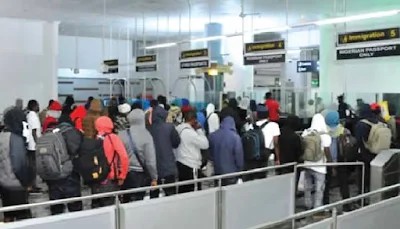The United States government has deported at least 2,330 Nigerians between 2014 and early 2025, with an additional 3,690 others currently facing removal orders, according to official data from the U.S. Immigration and Customs Enforcement (ICE).
A review of ICE’s annual statistical reports reveals that Nigeria accounts for the highest number of deportations from Africa, surpassing Somalia (1,539), Ghana (1,380), and Senegal (1,122) within the same period.
Between 2014 and 2024 alone, 2,310 Nigerians were deported, while another 20 were removed in the first quarter of 2025.
The yearly breakdown shows wide fluctuations in removals: 261 in 2014, 224 in 2015, 242 in 2016, 312 in 2017, 369 in 2018, 286 in 2019, 199 in 2020, 78 in 2021, 49 in 2022, 152 in 2023, and 138 in 2024.
The sharpest rise was recorded in 2018, under the administration of Donald Trump, when ICE deported 369 Nigerians following the controversial Executive Order 13768, which expanded deportation priorities. By contrast, the lowest figure was under President Joe Biden in 2022, when just 49 Nigerians were deported, largely due to COVID-19 travel restrictions and humanitarian policies.
The numbers, however, have begun rising again following a July 2024 U.S. Supreme Court ruling that restored stricter deportation guidelines prioritizing public safety and national security cases.
As of December 2024, ICE confirmed that 3,690 Nigerians remain on its non-detained docket with final removal orders. This is part of a broader list of over 1.4 million migrants from different countries awaiting deportation in the U.S.
ICE defines “removal” as the compulsory departure of non-citizens following a final order under the U.S. Immigration and Nationality Act, often due to unlawful entry, visa overstays, fraud, criminal convictions, or national security concerns.
Reacting to the development, spokesperson of the Nigerians in Diaspora Commission (NiDCOM), Abdur-Rahman Balogun, assured that the government is prepared to reintegrate returnees.
“We insist on dignified returns and support for deportees to rebuild their lives. An inter-agency committee involving the Ministry of Foreign Affairs and the Ministry of Humanitarian Affairs is already in place to handle any mass deportations humanely,” Balogun stated.
Immigration advocates have expressed concerns that the trend could worsen Nigeria’s economic crisis, especially as diaspora remittances from the United States alone exceed $20 billion annually.
They warn that forced removals risk breaking family structures and reducing inflows that many Nigerian households rely on for survival.
Do you want to share a story with us? Do you want to advertise with us? Do you need publicity for a product, service, or event? Contact us on WhatsApp +2348183319097 Email: platformtimes@gmail.com
We are committed to impactful investigative journalism for human interest and social justice. Your donation will help us tell more stories. Kindly donate any amount HERE




